IWhich One Of These Composers Is Not Known For His Writing Of Film Scores?
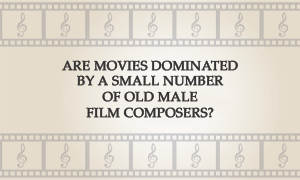 Last week, a reader emailed to ask "How many composers actually work in Hollywood?!" They then added: "It seems to me the same old men score all the movies".
Last week, a reader emailed to ask "How many composers actually work in Hollywood?!" They then added: "It seems to me the same old men score all the movies".
It's a great question so I thought I'd take a look and, along the way, see what else I could discover about film composers.
I used my dataset of all films released in US cinemas in the thirty years between 1988 and 2017 and focused on everyone who received a composer credit.
Top composers rule the sector
Across my dataset of thirty years of movies, 4,749 people received a composing credit. The vast majority of film composers did not work on another film after that initial credit (although they may have worked on other types of content, as I address in a later section). Fewer than a third received two or more composing credits and only 204 people received more than ten film composing credits – that's just 4.3% of film composers. 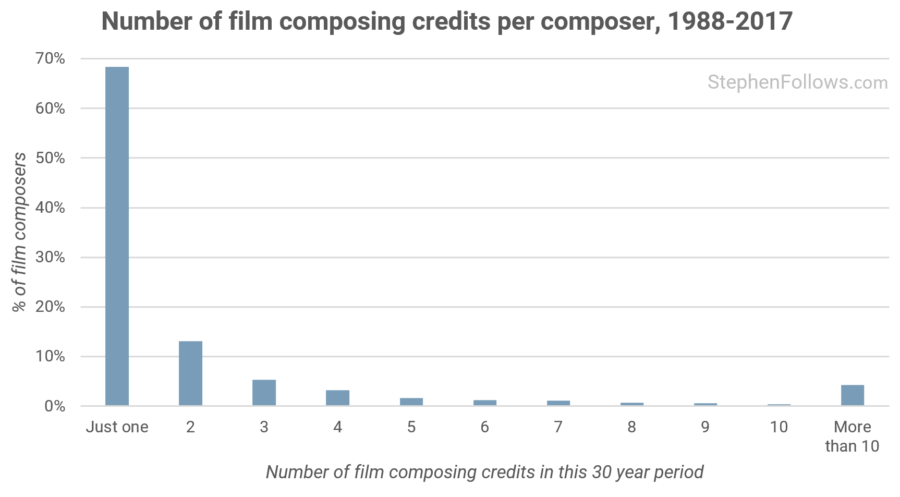 A small number of prolific composers do indeed dominate the marketplace. Hans Zimmer has scored 112 films over three decades and those films have grossed just shy of $30 billion at the global box office when adjusted for inflation.
A small number of prolific composers do indeed dominate the marketplace. Hans Zimmer has scored 112 films over three decades and those films have grossed just shy of $30 billion at the global box office when adjusted for inflation.
In fact, the top 20 film composers (as defined by total box office gross) account for 48.2% of all the money grossed in the movies studied over those three decades. 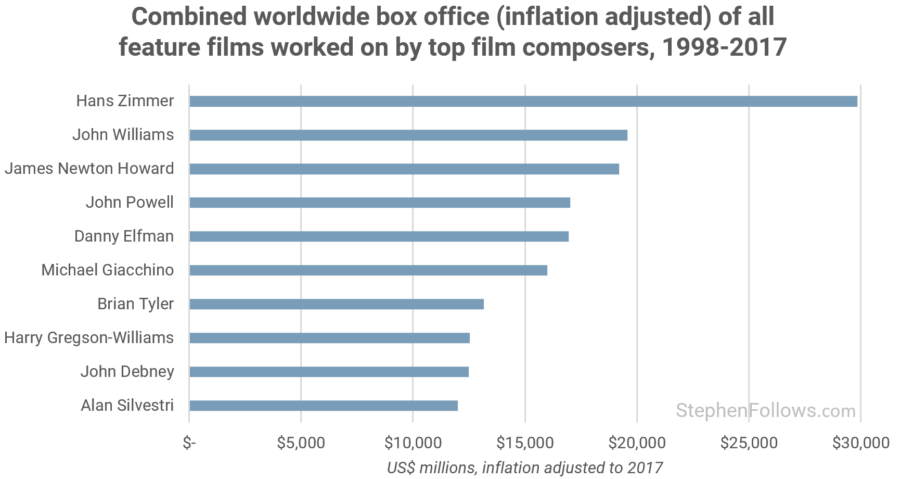
Managing to score well into their 50s
The reader suggested that film composers are "old". This is a highly subjective term and I'm not seeking to litigate that here. What I can do is look at the median age for composers and see how that compares to the median age for other roles.
I collected dates of birth for my composers (where available), which allows us to look at how old they were when their films were released. The median age of film composers on the top 200-grossing movies (1988-2017) was 46.6 years old. This has been steadily rising; the median age in 1988 was 41.4 years old but by 2017 it had grown to 54. 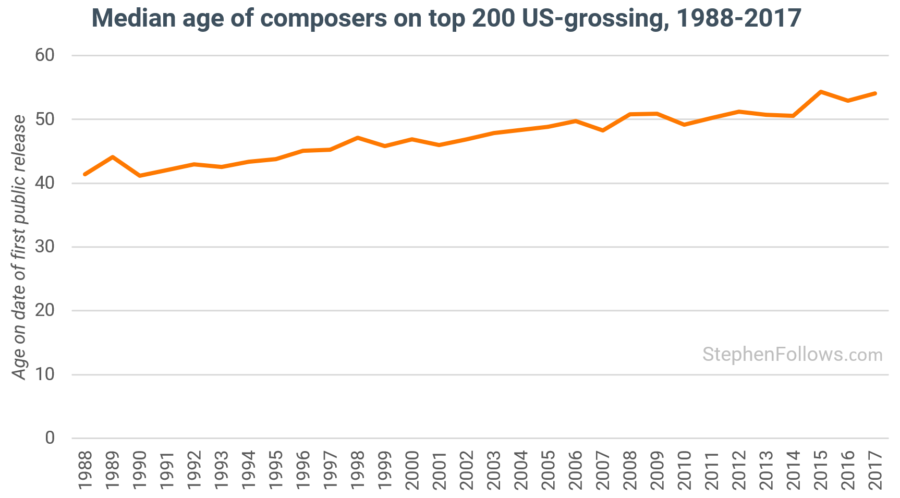 Among the youngest composer in my dataset was Markéta Irglová who was just 19 years old when Once was released, in which she starred, as well as singing and composing. She jointly won an Academy Award for Best Original Song.
Among the youngest composer in my dataset was Markéta Irglová who was just 19 years old when Once was released, in which she starred, as well as singing and composing. She jointly won an Academy Award for Best Original Song.
The oldest is uncertain as dates of death are harder to find than dates of birth. It's not possible to know if someone was old when the film was released or had already passed away. Composers can receive credits on movies long after they have… well, started to decompose. One such example is Bernard Herrmann, who is the sole composer credit on the 1998 remake of Psycho, despite dying 23 years prior.
A few years ago, I researched the age of writers, producers and directors so I can compare the composers' data to those roles. My original studies were only for the top 100 grossing movies but they still provide an interesting comparison. In 1995, all of the ages were pretty similar but as time has gone by, the median age of producers and composers has increased faster than that of other roles. In 1995, composers were the youngest of this group whereas by 2014 they had become the oldest. 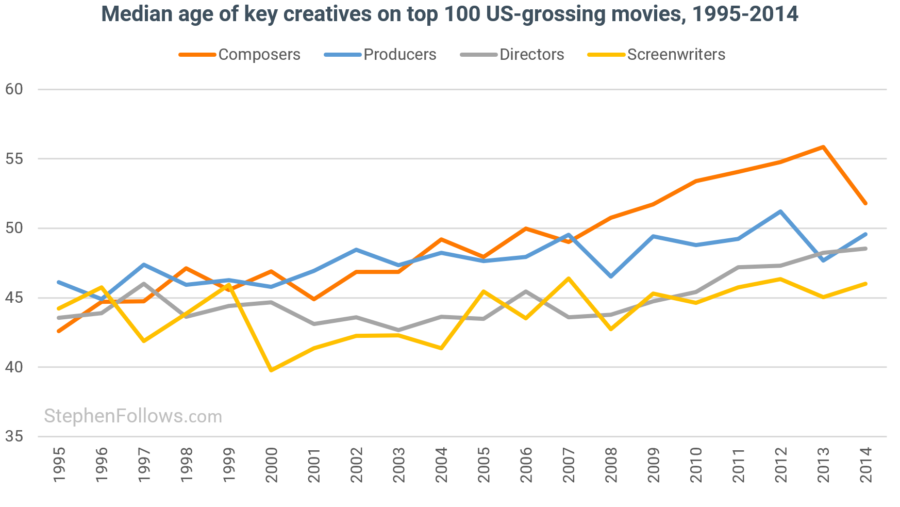
19 out of 20 film composers are men
In my past gender research, I have uncovered the massive gender disparity among film composers so the following section won't come as a surprise to my regular readers. In 2017, men accounted for 95.3% of all composers on feature films. Other male-centric roles include cinematographers (92%), directors (84%) and writers (83%). 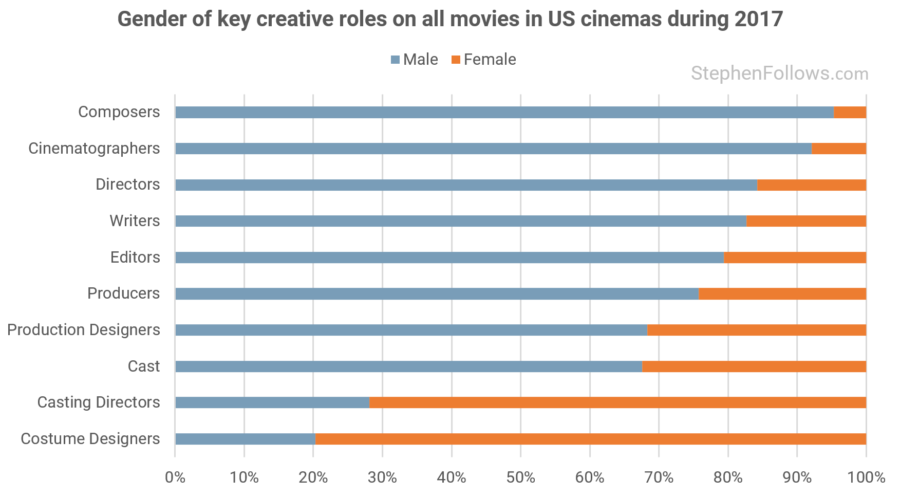 Over the past three decades, men accounted for 96.1% of film composing credits.
Over the past three decades, men accounted for 96.1% of film composing credits. 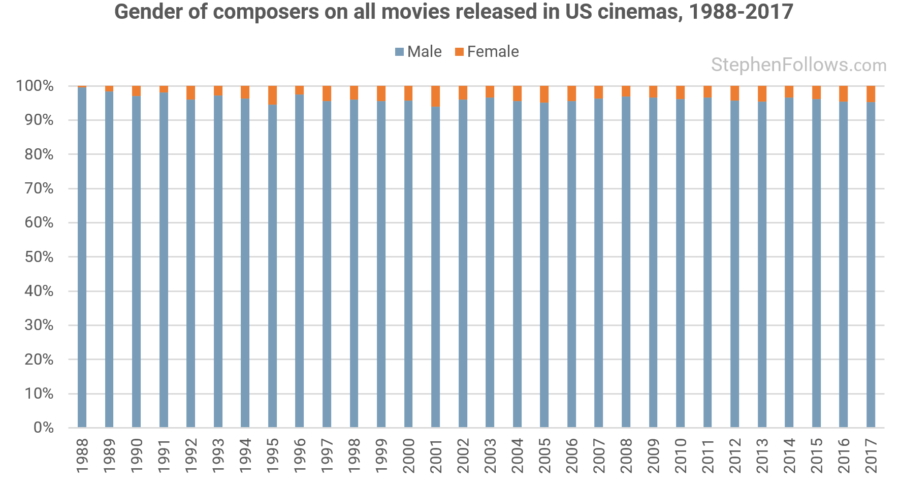
Where are they coming from?
Despite the fact that 68.3% of the movies in my study were American, only 38.5% of the film composers who worked on them were born in the United States. 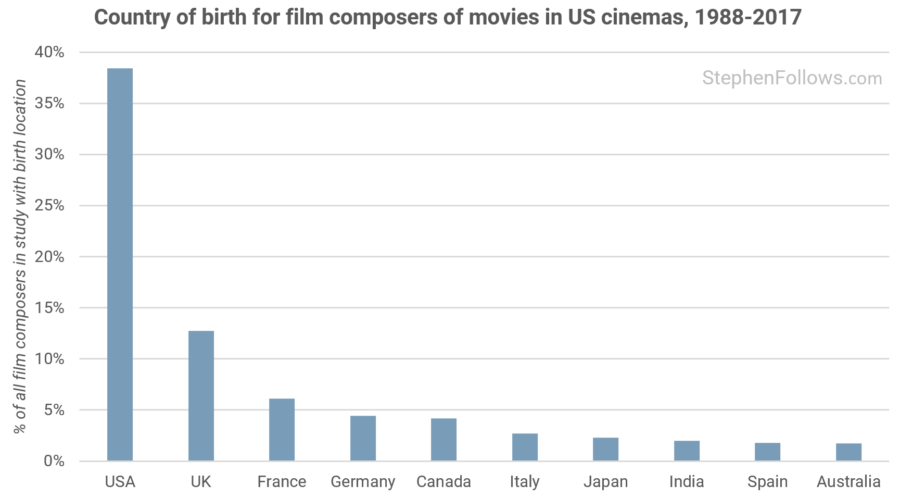
What else can they do?
Let's end our journey looking at what other things composers have done outside of scoring feature films. The majority of composers also received credits in the music department on my dataset of films, such as playing an instrument or conducting. After music-related jobs, the most common other credit was that of producer, with almost a fifth of film composers also receiving a film producing credit at some point. 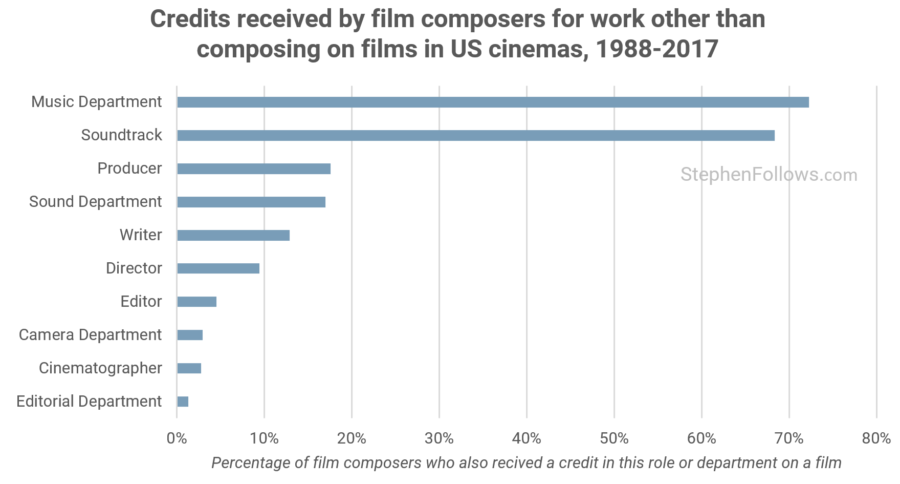 Finally, outside of the films in the dataset, composers have also created music for other types of productions. Two-thirds of feature film composers have also composed music for short films. Just over half have composed for TV shows and documentaries, but only 6.5% have also composed for video games.
Finally, outside of the films in the dataset, composers have also created music for other types of productions. Two-thirds of feature film composers have also composed music for short films. Just over half have composed for TV shows and documentaries, but only 6.5% have also composed for video games. 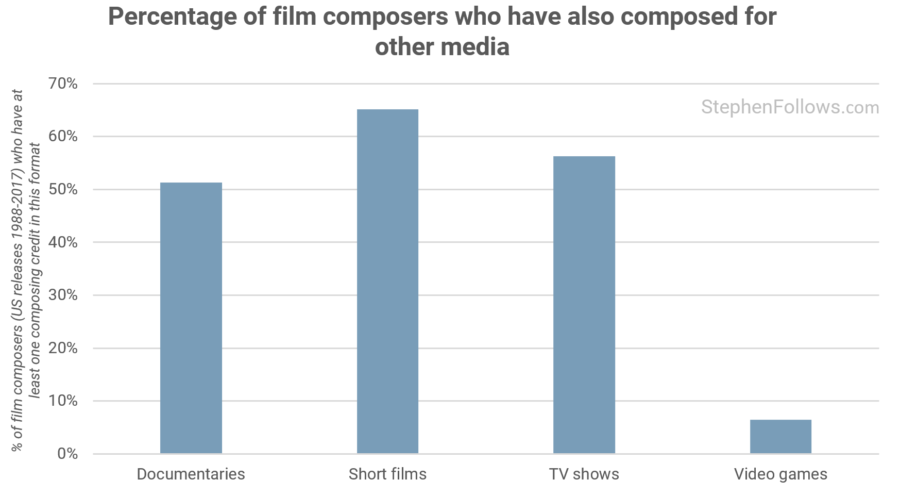
Notes
The data for today's research came from IMDb, Wikipedia, Box Office Mojo and The Numbers / Opus Data.
Dates of birth for less well-known composers are tricky to find. Overall, I found dates of birth for 58.9% of composer credits on all films and 75.7% on top 200 grossing films. There is obviously a strong bias towards better-known composers, meaning that the average age of all composers working is likely to be slightly lower. This is why I narrowed in on the top grossing films in the age charts above.
All talk of 'ages' relate to the age of the composer on the date of the first release, typically the US theatrical release. The actual work of composing will have been completed within a year of release and so if you are more focused on the age of the composer when they started work on the film, then a rough rule of thumb would be to remove a year from the ages shown.
To determine a composer's public gender, I used publicly available data, pronouns (such as in biographies) and first name analysis (i.e. if 99% of people called Daniel are male then I have regarded every Daniel with an unknown gender as male). I appreciate that this research takes no account of gender fluidity or other forms of self-identification. That's not a conscious choice but rather a consequence of doing research at this scale. If anyone can suggest a way of taking this on board in the research process then I am very keen to hear it. Please drop me a line and we can talk it through.
If there was anyone for whom I could not reliably determine a gender, then they were not included in the charts which show a percentage split between male and female composers. Although this is not ideal, I have no reason to think that these people skew towards one gender over another, and they were also a small percentage of my overall dataset. For the vast majority of the period I studied, composers are extremely likely to have publicly identified in a binary manner, no matter their true feelings or identity. This research speaks to how composers are judged from the outside and that it's the public-facing gender identity which matters most when it comes to discrimination.
The location of birth chart combines variations of countries into their current country, eg people born in both East and West Germany are listed under 'Germany'.
Epilogue
Thank you to the reader who asked the original question but who wanted to remain anonymous. It's been over three years since I last looked at ages and during that time my research skills and methods have improved. Therefore, when comparing my new data to the old data for the age of writers, producers and directors I feel that something is lacking. If you would be interested to see me go back and re-do the original age-related research to a deeper degree, drop me a line.
IWhich One Of These Composers Is Not Known For His Writing Of Film Scores?
Source: https://stephenfollows.com/film-composers/
Posted by: romerocolookstal44.blogspot.com

0 Response to "IWhich One Of These Composers Is Not Known For His Writing Of Film Scores?"
Post a Comment